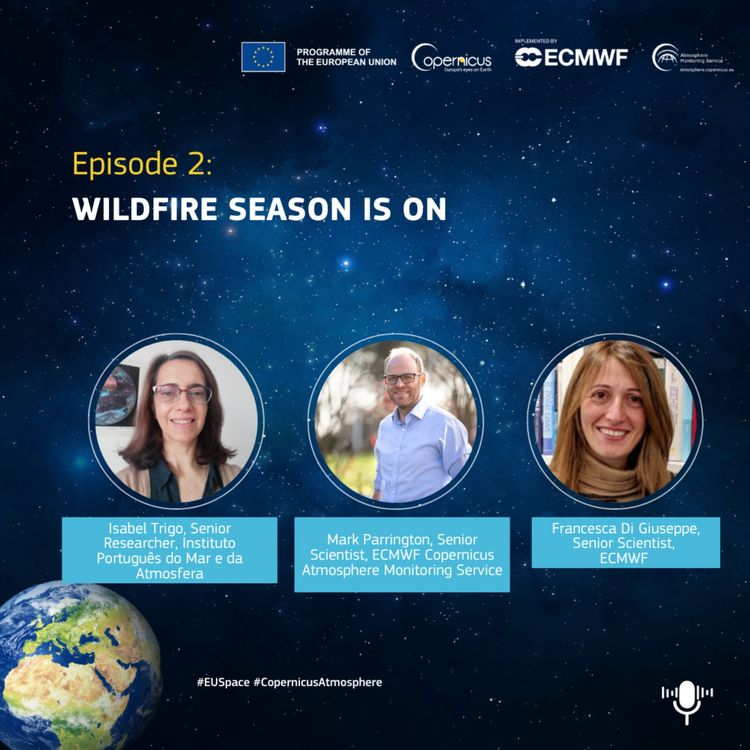Share

Climate & Atmosphere Spaces by Copernicus ECMWF
Wildfire Season is on
Season 1, Ep. 2
•
On 26 June, ECMWF hosted the second episode in their Twitter Spaces series, "Wildfire season is on." The discussion shed light on the alarming increase in wildfires and their impact on our environment. The event featured experts and scientists who have been at the forefront of studying wildfires: ECMWF Senior Scientists Dr. Mark Parrington and Dr. Francesca di Giuseppe, and IPMA Senior Researcher Dr. Isabel Trigo.
Get ready to explore the burning issue of wildfires during a live discussion which promises to be an energetic and thought-provoking discussion. With climate change escalating the frequency and intensity of wildfires worldwide, it's crucial to understand their implications and find effective ways to address this growing crisis.
More episodes
View all episodes

2. European State of the Climate 2023
44:29||Season 2, Ep. 2On 27 June, at 11:00 AM CEST, C3S and ECMWF hosted the second episode of the second season of the Climate and Atmosphere Spaces series, entitled “European State of the Climate 2023”. The discussion focused on the impact of extreme weather on human health, particularly heat, and the importance of climate services for the health sector.
1. Saharan Dust Storms
44:36||Season 2, Ep. 1On 21 March, ECMWF hosted the first episode of the second season of the Climate and Atmosphere Spaces series, titled “Saharan Dust Storms”. The discussion focused on recent extraordinary occurrences of dust transport with concrete examples, their impact on the atmosphere, and methods for monitoring them. The event assembled leading experts and scientists in Saharan Dust transport monitoring: ECMWF Senior Scientists, Dr. Mark Parrington and Dr. Melanie Ades, WMO Scientist Dr. Sara Basart, and DLR Dr. Elena Ruiz Donoso.Listen to this podcast to discover how dust particles from the Sahara spread across Europe, causing phenomena like red sunsets or orange-tinted snow. After witnessing exceptional events of Saharan Dust transport in recent winters, it is essential to understand these occurrences and their effects. Follow our expert panel through an insightful discussion on assessment, monitoring, and global impact.
Copernicus supporting Europe's renewable energy goals
59:13||Season 0, Ep. 0
1. Can Copernicus help you with your seasonal allergies?
42:47||Season 1, Ep. 1On 31 March, ECMWF is hosting a round table discussion on the topic of seasonal allergies and how Copernicus helps allergy sufferers. Alongside Vincent-Henri Peuch, Director of the Copernicus Atmosphere Monitoring Service (CAMS) and Deputy Director of the Copernicus Department at ECMWF, will be guests Mikhail Sofiev, a research professor at the Finnish Meteorological Institute in Helsinki and key scientist behind the CAMS offering of pollen information products, and Carla Jones, President of the EFA (European Federation of Allergy and Airways Diseases Patients’ Associations) and chief executive of the charity Allergy UK.The discussion will investigate the root causes of why pollens affect our health, the extent of the issue in Europe and how pollens are monitored in Europe. Dr. Peuch will further explain how CAMS forecasts pollens are made and discuss with Dr. Sofiev and Dr. Jones how this can directly help individuals with pollen allergies and their doctors to navigate the spring, summer and fall allergy seasons.